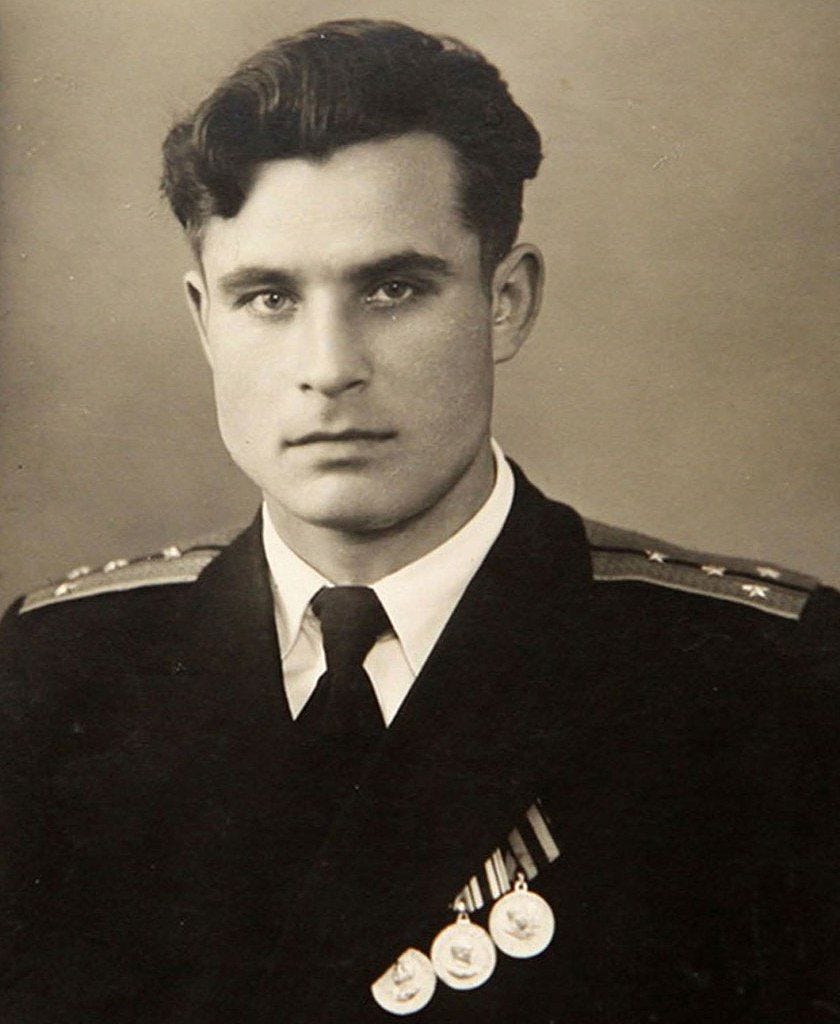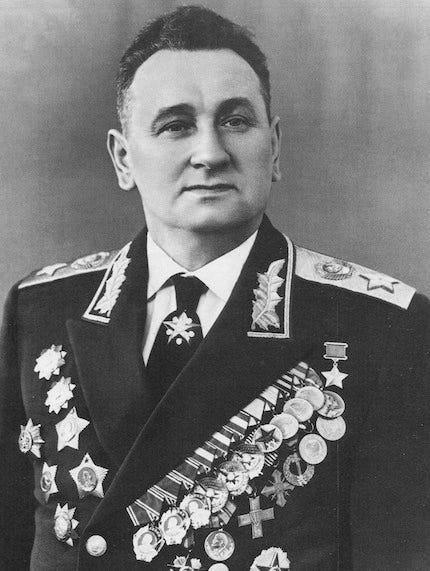At the height of the Cold War, Vasili Arkhipov would find himself in two deadly situations; the K-19 nuclear submarine incident in 1961, and the Cuban Missile Crisis aboard another submarine armed with nuclear torpedoes.
During the Cold War, high tensions between east and west resulted in many close calls. Some of these close calls involved nuclear weapons, and given the tense atmosphere, any mistake would have likely resulted in global war.
Among all of these stories is one which stands out both for its extremely high stakes, and the nearness it bought the world to destruction. That is it the story of Vasili Arkhipov and the Russian submarine B-59.
The date was October 1st 1962 - the height of the Cuban Missile Crisis. The Soviets had sent a number of nuclear armed submarines towards Cuba, to wait in international waters so as to strike US forces in the scenario that a nuclear exchange was to occur. One of these submarines was the Foxtrot class B-59, commanded by Captain Valentin Grigoryevich Savitsky. Leaving from its port in the Kola Peninsula, B-59 sailed towards Cuba.
The stakes were extremely high. Despite being in international waters, the Americans knew that these submarines could launch nuclear weapons at any time, and thus naval vessels were sent out to track them.
It was known that Russian and American forces would sometimes place nuclear weapons under the control of younger, single men. The reason was simple; if they had a family, they would likely hesitate. Young men without these commitments were less likely to think through such a decision.
- Usually, Soviet submarines required two men to authorise a nuclear launch - the captain, and a political officer. However, B-59 was different, requiring the three most senior officers onboard to authorise launch. Those were Captian Savitsky, Political Officer Ivan Maslennikov, and an Executive Officer Vasily Arkhipov. All three men would have to agree before any action could be taken.
Vasili Arkhipov, although not the most senior officer onboard, was more than experienced with submarines and stressful situations. Just one year prior, he had served as Executive Officer aboard the nuclear powered K-19, during the infamous nuclear reactor emergency off the coast of Greenland. With the risk of a reactor meltdown, Vasili and the crew devised a plan to build a secondary coolant system onboard the sub to avoid catastrophe. Vasili and the engineering crew all exposed themselves to high levels of radiation to stop the meltdown, with 22 of the crew dying from their exposure not long after. It is safe to say that after this, he was more than experienced at keep his cool in high stress situations. This demeanor would come in handy.
_______
On October 27th, after a few week off the coast of Cuba, their submarine was forced into a corner. A US aircraft carrier and 11 battleships patrolling the international waters around Cuba detected B-59 but could not identify it. Attempting to force the B-59 to surface, these battleships began to close in on the sub. To signal to surface, the navy began to drop low-yield practice depth charges - known as Signalling charges - designed to alert the submarine crew without actually causing serious damage to the ship. This practice was employed in order to identify the submarine, who could not properly communicate with the boats on the surface. This would usually be accompanied by a message, hoping the information would be received.
However, having not received any messages from Moscow or the US navy in several days, B-59 was completely in the dark, only able to intercept some radio signals from the US. When depth charges began to explode, the crew assumed the worst. The situation was now in the captains hands. The order was given to dive far deeper and maneuver so as to hide from the pursuing vessels. As they got deeper, they lost radio communications.
After some time, Captain Savitsky began to fear the worst. Believing that the sub was actually being attacked, and with a silence on the part of both Moscow and the US navy, he believed that a war may have started. Given the tense situation in Cuba, the outbreak of war was not unbelievable, and thus many of the crew likely believed the same thing. Following protocol, Captain Savitsky decided to prepare for battle. The crew sprung into action, and before long the submarine was ready to begin firing torpedoes at the US battleships. The first in line to be fired was the 10 kiloton T-5 nuclear torpedo.
After lining up the submarine with the US ships, Captain Savitsky requested authorisation to launch. As per usual, despite being the captain, he required the authorisation of the political officer, and in this particular circumstance, the authorisation of the chief of staff of the brigade Vasili Arkhipov. By this point, most on board were convinced that the battle had started. The Captain gave his authorisation for launch, followed by Political Officer Maslennikov. The decision came down to Vasili Arkhipov, who was uncertain.
Arkhipov began to talk with Savitsky, saying he believed there was not enough evidence to suggest a war had started, whilst another crew member - Vadim Pavlovich Orlov - recalls that Savitsky momentarily lost his temper, while Arkhipov calmed him down. He said that there best option was to surface and wait for orders from Moscow. By this point, they had been under water for some time. The air conditioning cut out, causing carbon dioxide levels and heat within the sub to increase. Finally, the captain agreed, and the sub began to surface.
Arkhipov recalls that upon resurfacing, an American aircraft began to fire warning shots alongside the ship. Luckily, they had surfaced near the pursuing battleships, who soon made contact.
Moscow did eventual contact B-59, shortly after they had surfaced and contacted the Americans. The Soviets ordered B-59 to return to Russia. Upon their return, the crew was disgraced by their superiors. They were told by one admiral that “it would have been better if you had gone down with the ship”, whilst another - Marshal Andrei Grechko - was angered both at the crews inability to keep secrecy, and later the fact that they were operating diesel electric rather than nuclear submarines. According to one report, he took of his glasses, hit them against the table, shattering them into pieces, and abruptly left the room.
Vasili’s wife recalls that after this, he didn’t like recalling the events, believing that no one appreciated just what they had gone through.
Vasili Arkhipov’s experience set him apart from his fellow personnel, as someone capable of staying level headed even in a life or death situation. Despite his superiors inability to comprehend what they had just gone through, and the disgrace they faced in the Soviet Union, Arkhipov’s decision ultimately saved the world from nuclear war.













Share this post